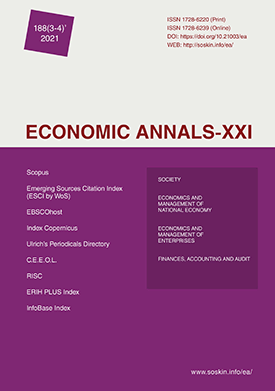The functioning of the credit market in the European Union and the consequences of legal regulations regarding the cost of credit on the example of Poland
The functioning of the credit market in the European Union and the consequences of legal regulations regarding the cost of credit on the example of Poland
Author(s): Natalia WasilewskaSubject(s): Economic development, Law on Economics, EU-Approach / EU-Accession / EU-Development, Financial Markets
Published by: Institute of Society Transformation
Keywords: Bank; Loan Fees; Consumer Credit; Borrower; APR; LTV; Lending Legislation; Euro Area; EU; Poland; Emerging Market Economies;
Summary/Abstract: The purpose of this work is to determine the level of financial obligations the borrower assumes when obtaining a loan in Poland, depending on the conditions under a credit agreement, circumstances related to getting and repayment of the loan. It is found that from to January 2008 to January 2021 in emerging market economies the level of credit to the non-financial sector in the percentage of GDP is increasing to 240%, in Member states of the Euro area - about 292%. The study found that in countries in the emerging market group, the level of financing increases much quickly than in Euro area. Thus, in January 2021 compared to January 2008, the level of financing (credit to non-financial sector from all sectors at market value) in emerging market economies has tripled, while in Euro area member countries this ratio increased on 33%. In Poland, the level of financing during mentioned period increased to 141.1% and as of January 2021 amounted to USD 881.8 bln. The development of bank lending is only possible if there is a transparent relationship between the banks and the borrowers that helps to minimize credit risk. The analysis of credit legislation in the EU countries made it possible to find that there is a problem with presentation of information on the calculation of the credit costs in a transparent and understandable way. It was established that the credit costs in Poland, taking into account its maximum level, can have a significant impact on the borrower’s creditworthiness and obtaining information on the «real» credit costs is necessary to make good decisions by a potential debtor. According to the results of the study, algorithms for calculating the credit cost were proposed, that make it possible to present all components of the costs and its level depending on the conditions for granting a loan. The results of the research can be used by potential borrowers before deciding to take a loan in a Poland bank to determine all the costs related to the loan. The research is in line with an idea of «economisation of law» or «financialisation of law».
Journal: Економічний часопис - ХХІ
- Issue Year: 188/2021
- Issue No: 3-4
- Page Range: 158-173
- Page Count: 16
- Language: English

